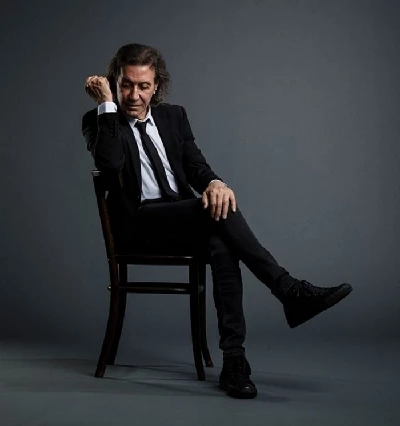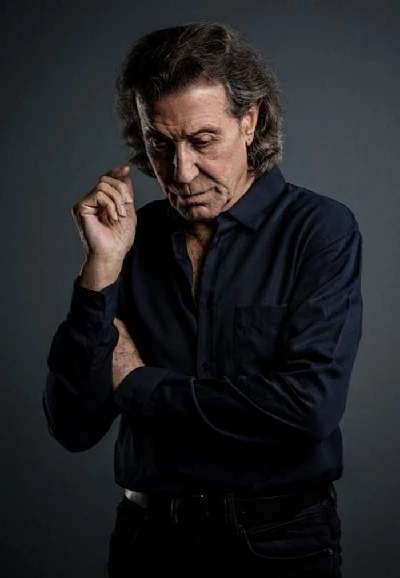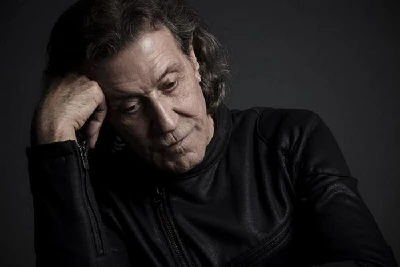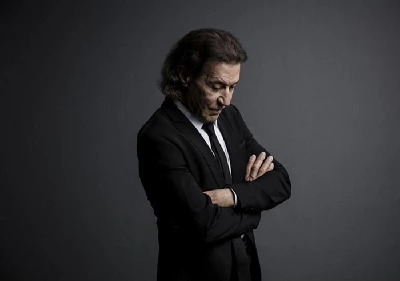published: 12 /
8 /
2017
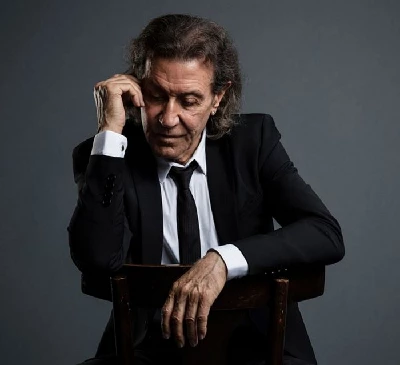
Multi-award winning performer and songwriter Albert Hammond rose to the challenge of releasing 'In Symphony', in which he reimagines some of his best known songs with the help of an orchestra. He speaks with Lisa Torem about fulfilling a lifelong dream and more
Article
Raised in the British overseas territory of Gibraltar, singer/songwriter Albert Hammond fully embraced that thriving region’s multiculturalism. His recordings, both in Spanish and English, have inspired international audiences to sing along and smile for decades.
Perhaps it all began with Leapy Lee’s cover of ‘Little Arrows,’ a 1968 co-write with Mike Hazelwood. Hammond, a dishwasher at the time of its airing, held his tiny transistor radio to his ear, in disbelief. Had it not been for the Beatles’ ‘Hey Jude,’ Lee’s version would have grabbed the number one spot in the UK.
But it is the 1973 album that catapulted Hammond to fame, ‘It Never Rains in Southern California,’ that still stands to be the best indicator of Hammond’s overall staying power. The signature story is so authentically penned that one would never guess Hammond finished it off in a Fulham flat on a miserable, grey day. It’s the same song that British producer Clive Davis urged Hammond to sing during a fateful audition; Hammond had been hesitant to perform the song, as his friends and colleagues didn’t see its potential. Little did they know that Clive would, or that this ballad would go on to become one of the young artist’s most lucrative hits. That same album also yielded ‘Down by the River’, which Albert name checks during our chat about global warming, ‘The Air that I Breathe’, an outstanding hit for The Hollies in the 1970s, plus the much-covered ‘The Free Electric Band’ and ‘I’m A Train’ — crowd-friendly ballads with undisputed, universal appeal.
Hammond prides himself on crafting songs with powerful messages that unite fans and defy typecasting. That said, his showmanship and evocative stories have always attracted fans from the fields of pop, rock, jazz, country and finally, classical.
‘When I Need You’ was co-written with Carole Bayer Sager and recorded by Leo Sayer on ‘Endless Flight’ in 1976. It was Sayer’s first no. 1 single in the UK.
‘To All the Girls I’ve Loved Before’ co-written with Hal David, inspired a duet between two, talented, but unlikely-to-be paired vocalists: Julio Iglesias and Willie Nelson. But then that’s the miracle of Hammond’s muse; his ability to write powerful ballads that transcend tradition.
The melodious and inspirational ‘One Moment in Time’ earned Whitney Houston a Grammy nomination for Best Female Pop Vocal Performance and was included in the 1988 Summer Olympics Album: ‘One Moment in Time’, which underscored the Olympics in South Korea held in the summer of that year.
His ‘Songbook’ albums, released in 2013 and 2015, knelt at the heart of this troubadour’s leanings. Then, his ‘Legend’ album featured duets with Al Stewart, Ron Sixsmith, Albert Hammond, Jr., and Cliff Richard. It was a fine and ambitious project, but Albert’s moved on to the next challenge. 2017 commits to a project that encapsulates all that came before and more.
His latest album, In Symphony, will appeal to a larger population of listeners than his previous releases. Hammond’s black and white cover photo speaks volumes. It features a classic shot of a mature, confident artist. The album beneath this cover contains a series of Hammond’s most well-known hits—both in Spanish and English, but for the first time, they are stunningly re-imagined, as the title suggests, in sophisticated, symphonic form. But besides the fusing of majestic horns, lavish strings and Hammond’s sonorous baritone, In Symphony invites other surprises; for example, a duet between Hammond and his eight-year-old self!
Welcome back, Albert Hammond!
PB: Hi Albert. Congratulations on In Symphony. I’m sure it was exciting to work with the Trinity Boys Choir and the London Symphony Orchestra. How was it working with arranger Rob Mathis? (Bruce Springsteen, Sting, etc.)
AH: The first time I met Rob was when I was inducted into the Songwriter’s Hall of Fame in 2008. He was the conductor and I sang. I met him there, and then when I was going to do this record, I thought he would be the right person to help me record this, and he was.
PB: Did you have a lot of input in terms of orchestration or did Rob say, ‘Here’s the score. Let’s record your vocals?’
AH: We worked on it in New York for a while, quite a while; about a month. We did a lot of preproduction and so once we went in, we more or less knew what was going to happen. My idea wasn’t just doing a record with a symphony orchestra, it was, how would “the greats” have done it?
How would Beethoven have arranged ‘When I Need You’, for example, or how would Tchaikovsky have done ‘The Electric Band’? There was a lot of thought put into it on both parts; on Rob’s and mine.
PB: Was this the first time you had recorded an album at the legendary Abbey Road Studios?
AH: I’d worked at Abbey Road before, but that’s the place. It’s just a magical place and it just feels good to be there. The room is also a great room and I wanted to do it in London because I was in Europe anyway. Rob had an idea of putting together a symphony that we would invent—four different symphonies. So we picked the best musicians from four different symphonies.
PB: What was it like to do a duet with your eight-year-old self?
AH: It really broke me up.
PB: Which song on the album shows a side of you that perhaps we’ve never seen before?
AH: Probably ‘One Moment in Time’ because it’s a big song and I don’t have a voice for a big song. So if I ever wrote a big song, I would probably give it to someone who has that kind of a voice because they’re going to interpret it in a better way than I can, or I think that, but maybe it’s not true, I don’t know…
But it was very challenging to do a medley of ‘When you Tell Me that you Love Me’ and ‘One Moment in Time’. ‘When you Tell Me that you Love Me’ was recorded by Diana Ross and ‘One Moment in Time’ by Whitney Houston, so my competition was great. (Laughs) So when I sang it, I thought to myself, You’d better do a good job. (laughs)
PB: ‘It Never Rains in Southern California’ and ‘The Air that I Breathe’ are beautiful songs, but I think they hold deeper meanings when you consider the effects of global warming.
AH: I think I wrote the first green song. It was a song called, ‘Down by the River’ which was my first single before ‘It Never Rains…’and it’s really about that. I’m very concerned about global warming. But I’m not just concerned about global warming, I’m concerned about the earth and what we’re all doing to it. It’s not just about global warming, but about everything else.
PB: You have mentioned in other interviews that you would enjoy performing with your son, Albert Hammond, Jr., guitarist/songwriter for the Strokes. If this were to happen, how would you compromise; it seems that you two have quite different musical tastes.
AH: I think we would probably both have to compromise on music. But I think if we ever did that, I think we would probably just write new songs or maybe find an old song of his and an old song of mine, too, and do them in way that we both feel would suit us.
PB: You have worked with so many talented artists. Are there some in particular that you felt extremely comfortable performing with/writing with?
AH: I haven’t really written with that many artists. I’ve written with songwriters. I felt very comfortable with Johnny Cash, Roy Orbison, Neil Diamond, Tina Turner, Julio Iglesias, Willie Nelson. There are many artists with whom I’ve not only worked with, but I’ve also produced records for. I felt very comfortable because they were great people. Sometimes the artist is not what people think. They’re just normal, human beings, I guess. I know because I’m one of them (Laughs). I’m just a normal guy that loves to do what he does. Don’t forget the stars are in the sky.
PB: Can you list a few of your favorite composers in the fields of classical and pop?
AH: Classically, I would consider Handel and Schubert. I love all of them, because I love classical, but that melodic way of writing that they both have, I love. Then it depends on whether it’s country or pop. I love Beatles songs. My favorite all-time song is ‘Imagine’ because it’s a great dream and if we could make it come true, it would be a better world.
I’d love to go and perform in America, I really would.
PB: Will you?
AH: I would love to find someone who would take me. I do like 140 concerts all over the world, but the U.S--because I stopped performing for over 30 years, I just wrote and produced. People kind of forget you, but if I went back, they would remember pretty quickly. It’s really nice what I do now—the ‘Songbook’ thing, and also now the symphonic thing, which is great.
PB: You’ve performed hundreds of times over the years. Do you see any differences between the international audiences?
AH: Oh, yeah. For example, the Germans and Dutch and the Danish are up to having fun. The Irish, too, they love to sing with you. The English are more reserved. They just sit and fold their arms and you don’t know if they like you or if they don’t, but at the end, they stand up and applaud you, and give you a standing ovation (Laughs). So I think, I guess they did like you. (Laughs) It’s just a lot of fun.
PB: Can you remember the first song that you ever wrote?
AH: There was a school ship; a big, ocean liner that brought school children from Scotland on a Mediterranean cruise and they stopped in Gibraltar. I was fifteen-years-old. She was thirteen or fourteen. I was invited to sing on this ship. She sat in the first row and I sang my forty minutes, whatever it was, and she looked at me, without taking her eyes off me, and so when I finished singing, I took her by the hand and we walked around the ship for an hour, and then when the ship sailed off, I had a pain in my stomach and I knew that I had kind of fallen in love or something, so I went home and I wrote my first song. It was called ‘Blue Boy’.
PB: You’re doing a new work about the Matterhorn.
AH: I’m doing a musical with a German writer, Mike Kunde. It’s actually about the first man to get to the top of the Matterhorn. It was an Englishman called Edward Whimper, who wasn’t even a climber, he was just a sketcher. He sketched the mountain and he ended up falling in love with the Matterhorn, like it was a woman. And he said, ‘I will conquer you one day’ and he did.
It’s never been done before. No musical has ever been done about a mountain.
PB: Are you a mountain climber, too?
AH: No, I can climb steps (Laughs).
PB: How do you structure a musical with such a broad theme?
AH: I’m still working on it. It will be on in St. Galen, Switzerland on the 18th of February of next year. I have the first act done and we’re working on the second act. We’re casting, also. We have a director. We have a stage designer. It’s a never-ending story. Sometimes even a few weeks before it opens, you change things; it’s an exciting thing, but I love a challenge.
My symphonic record is a challenge. It’s a challenge for the record company to give this kind of money to a 73-year-old man. I don’t know if they had smoked something that day and said, Sure, let’s go ahead and do it. I have no idea, but they said, go ahead and do it and it’s actually a beautiful record. I love it and I love them for taking the challenge. BMG is a wonderful, wonderful company and I’m very proud of this record and so are they.
I will work this record for the next twenty years because it’s that kind of a record. It’s not a record that will last three months. it’s a record that will last a long time.
PB: Is there any other news that you would like to share with us?
AH: I will be playing the Cardigan Hall on the 19th of September in London with the London Symphony Orchestra and the 3Arena in Dublin, Ireland on the 16th of September.
PB: With so many new projects going on and the constant touring, how do you maintain your stamina?
AR: I’m actually trying to get over bronchitis, laryngitis and a cold. I’m on antibiotics and I’ve got a show tomorrow, Saturday and Sunday. I’ve got three shows. How do I keep it up? I’m in love. I’m in love with life and music and with people and the world. Life is beautiful.
PB: That’s so inspiring, Albert. Thank you.
AH: Thank you.
Band Links:-
https://www.facebook.com/AlbertHammond
http://www.alberthammond.com/
https://twitter.com/alberthammond
https://www.instagram.com/alberthammon
https://www.youtube.com/user/albertlou
Picture Gallery:-
